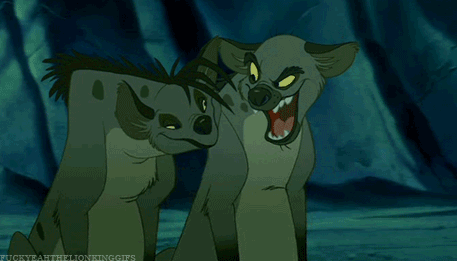
Sunday, April 28, 2019
Sunday, April 14, 2019
Rooney Gooding-Williams & Morton
While I understood the bulk of Gooding-William’s argument and do believe he made valid and strong points, some of his ideas I do not agree with. I found his analysis of the “Euro-centric picture of Africa” interesting, as well as the point that the depiction of the circle of life as “endless” might “reduc[e] Africa to the endless reproduction of a natural and pre-historic course of life”, devoid of cultural, political, social, etc development. However, The Lion King is about animals and not people. Morton’s point that “Africa thus becomes the repository for timeless values, although that does not mean that the place itself is without history” articulates that the writers employed the circle of life to impact social values (that are undoubtedly western) but it never broaches actual African history (or the history of the specific region that the Lion King takes place in because Africa is not a country nor does it have one ~history~).
I also didn’t totally agree with his analysis of Scar- primarily that “the future he envisions would not entail the persistence of a form of life that ‘has always been’, but the creation of a utopia that has not yet existed. Scar fails, because his will to create utopia creates dystopia”. I would not say that Scar ever aimed to create a Utopia, rather his own ideal dystopia. I don’t think he fails at this except that he destroys the ecosystem, though his goal was never to preserve the circle of life. Morton argues that “it does not strike me that Scar and the hyenas represent a victory of history over the timeless ‘circle of life’”- Scar’s rise to power is not the one historical event given to ~Africa~. The Circle of Life is instead used as a metaphor for “law, order, and enlightened hierarchy”, and Scar merely disrupts it momentarily.
Finally, I don’t agree that the writers of The Lion King were going for a metaphor for American Inner City. While there are absolutely elements of this, primarily with the Elephant Graveyard representing the inner city/slums/projects/poor part of town, and that element was likely intentional whether consciously or unconsciously, as a whole, I don’t see it. The Elephant Graveyard and the accepts/portrayal of the hyenas is problematic or racist or classist. Yes. But rather than an intentional and explicit commentary, this likely was a product of the unchecked biases of the creators as they tried to portray evil.
Rylee Bowen, Gooding-Williams vs. Morton

 The Lion King has brought on a tsunami of opinions on how Disney handled race and social identities. Robert Gooding-Williams, a professor of African studies and Philosophy at Columbia University, wrote "Disney in Africa and the Inner City: On Race and Space in the Lion King." This piece argues that the Africa Disney created is a metaphor for the U.S. "Simba and Nala are interpreted as lost in the inner-city of disenfranchised black and Latino residents (represented by the hyenas), & scar is read as empowering these denizens by giving them the political power they have lacked." (Gooding-William) His paper centers around the "invisible" social relations that push urban poverty onto unsuspecting Disney viewers. For the majority of the paper, Gooding-Williams battles the ideas of Hegel. Hegel called Africa "historyless" in which he meant Africans were unable to evolve spiritually. GW goes to explain that Disney's portrayal of Africa only solidifies Hegel's claim because the "Circle of Life" is so natural and idealized. It leaves no room for history. But do I agree with this? No! This view is a harsh view of Disney. The Circle of Life wasn't created to avoid a lack of spiritual growth, it was meant to accompany it.
The Lion King has brought on a tsunami of opinions on how Disney handled race and social identities. Robert Gooding-Williams, a professor of African studies and Philosophy at Columbia University, wrote "Disney in Africa and the Inner City: On Race and Space in the Lion King." This piece argues that the Africa Disney created is a metaphor for the U.S. "Simba and Nala are interpreted as lost in the inner-city of disenfranchised black and Latino residents (represented by the hyenas), & scar is read as empowering these denizens by giving them the political power they have lacked." (Gooding-William) His paper centers around the "invisible" social relations that push urban poverty onto unsuspecting Disney viewers. For the majority of the paper, Gooding-Williams battles the ideas of Hegel. Hegel called Africa "historyless" in which he meant Africans were unable to evolve spiritually. GW goes to explain that Disney's portrayal of Africa only solidifies Hegel's claim because the "Circle of Life" is so natural and idealized. It leaves no room for history. But do I agree with this? No! This view is a harsh view of Disney. The Circle of Life wasn't created to avoid a lack of spiritual growth, it was meant to accompany it.
John Morton begins his debate, "Simba's Revolution: Revisting History and Class in The Lion King" by ROASTING Gooding-Williams' views. He calls then "revealing" and "problamatic" and explains that Disney's Africa is "the site of history and ongoing struggle." Morton also talks about the alliance formed between "the working class," Timon and Pumbaa, and "the ruling class," Simba. I liked this paper a lot more, but it felt unorganized. While it was written to debate the claims made by Gooding-Williams, it went off on its own quite a few times. Morton kept his paper professional and unbiased where Gooding-Williams' felt very in my face. I especially liked how Morton suggested the power struggle between Simba and scar just represented the classic clash of good and evil. I agree with Morton's claims more. Reading Gooding-Williams' piece felt like I wasn't recieving all of the information and was only seeing part of the picture.
Rose Morton Blog Post
First, I will argue for who I believe wrote their argument
better. It seems very obvious to me that Morton is much more talented in
explaining his side than Gooding-Williams. Gooding Williams jumps around in his
piece and it can be quite difficult for the reader to follow. Gooding-Williams
bases his entire argument off the casting of the voices of two of the three hyenas,
which is far-fetched and points to the larger problem of Gooding-Williams not
having enough evidence to properly explain his beliefs. At one point in the
article Gooding-Williams just writes the argument of Hegel, and did not seem to
explain any part of the put in any analysis (if he did I could not understand
it because it was so jumbled). One of the things that we have talked about in
class is the use of quotations as evidence and the problems of hanging quotes. Gooding
Williams would benefit from sitting in on that lecture. Morton, however, explained
his argument very clearly and it was well laid out and easily read. Morton
begins his argument by trying to explain Gooding-Williams’ which is an
effective strategy. Funnily enough Morton explains the argument in a more
concise and clear way than Gooding-Williams, which as we have discussed is an
effective way to build ethos in an article. As Morton writes out his argument
he does so in a clear manner that addresses every point with very specific
evidence and analysis. This made the article easier to read and allowed me to
understand the argument.
I may be biased because Morton argued his point much better,
but I truly stand by Morton’s side. The idea that The Lion King is some complex metaphor for poverty, and segregation
in the United States seems to be a large reach to me. Furthermore, I think that
the fact that Gooding-Williams clearly struggled to find evidence to back his
claim shows how little basis there is in support of the argument. On the other
hand, Morton’s less complex, but smooth, argument is in no way a reach, but
much more believable. While we have read pieces by Giroux and Zipes that implore
us to look for the deeper meaning in Disney movies, the reality is that a
person can only look so much deeper until they are grasping at straws, which is
where I believe Gooding-Williams goes wrong. In my opinion, Disney movies are
children’s movies. They are designed to entertain children and while there are
definitely valid arguments for significant deeper meaning in some films, I do
not think Gooding-Williams’ argument is one of them.


Charlotte Hagerty on Williams and Morton

Reading these two pieces in conversation was a testament to academic writing as a conversation. John Morton’s essay “Simba’s Revolution: Revisiting History and Class in the Lion King” was a great example of “I concede, but” in response to Robert Gooding-Williams piece “Disney in Africa and The Inner City: On Race and Space in the Lion King”.
Though Williams’s pieces did have a promising thesis, he went too far with his analysis and pushed his piece into convolution. Some of his political commentary is strong because, as we have discussed at length, Disney does not exist in a void and it does speak to greater cultural values and trends. Thus Williams’s conception of the Lion King universe as those who have political power and those who don’t is valid. However, he integrates too much of his own personal political views and his argument loses merit. I understand where he is coming from in the argument that the hyenas, as voiced by Whoopi Goldberg and Cheech Marin, are representative of a marginalized Other, I think it is equally possible that they were just two of the most notable comedians of the time, so of course Disney tapped them to be in the film.
I enjoyed reading Morton’s response to Gooding, as it gave credit where credit was due, while still aptly discussing the shortcomings of his argument. Although Morton appropriately calls out Gooding-Williams for overstepping in his interpretation, Morton’s first main criticism of Gooding-Williams is that his take on the ahistoric portrayal of Africa is completely off base. Gooding-Williams sees a vision of Africa in Disney’s depiction of Pride Rock— “steeped in the spiritually static and essentially unchanging conditions of ‘mere nature’.” However, the ‘circle of life’, the central image and theme of the film, seems to be pretty dynamic. Further, though Mufasa discusses the shadowy area to the north as a forbidden place, he never specifies why it is forbidden or what political tensions could have brought it into existence. In fact, the entire history of Pride Rock is presented as full of benevolent rulers, a testament being the watchful kings in the night sky. Morton, however, sees the plot of The Lion King as evident of the historic nature of the place. What makes the movie a compelling story is that the Scar power-grab is deviates from the norm.
That being said, Morton makes an interesting point of distinguishing the conflict in The Lion King as between producers and scavengers. Disney may not have initially intended this dynamic to invite a strong political analysis, but it would make sense that both Gooding-Williams and Morton found something political inherent in the depiction of this good/evil dichotomy. Gooding-Williams, however, was problematic in assuming that most viewers of the film would read the scavengers as black and Latino urban citizens.
Thus, neither argument was foolproof. Though both had valid points they also each felt like a stretch. Regardless, I feel as though Morton's was the stronger piece as it was able to take a step back and did not feel infused with personal bias.
Samuel Joseph Response: Gooding-Williams and Morton
Before I start, I just want to make clear
that my argument may be slightly biased, and to take these words with a grain
of salt. I had a lot of problems with Gooding-Williams’ understanding of The
Lion King, and it was very difficult to extract my personal bias from my
interpretation of his argument in comparison to that of Morton. While both arguments
have flaws, my bias persuades me to join Morton’s side as the better argument
overall, although at some points, I believe that Gooding-Williams has even more
compelling arguments.
To begin with Gooding-Williams’ argument,
I believe he himself presents an argument filled with preexisting internal
bias. What started out as a political interpretation of the Lion King developed
into an extremely racist and radical view of something that potentially no one
would have seen before. All the ‘positive’ things that Gooding-Williams did to
bolster his argument, due to my bias, made me count off for his argument. In
the beginning, he addresses the naysayers, which is a ‘positive’ effort to
start your argument. From TSIS, addressing the naysayers actually serves to
bolster your argument and add ethos instead of bringing down your credibility
(it also shows that you are not single-minded and open to other arguments). While
he mentions opponents will argue that these films are made for entertainment, he
refutes this by saying that thinking from this perspective casts out your
ability to see the undertones in the film. While I do agree with this, the way
that Gooding-Williams goes about arguing this makes me want to disagree with
him. He presents his argument as the only way that is correct with extremely
radical thought. So in fact, in my opinion, his addressing the naysayers actually
lowers his argument.
He does bring in outside sources and direct quotes in
Hegel. While this should serve to add ethos to his piece, the outright racist and
non-progressive nature of Hegel’s argument causes me to dislike the argument as
a whole. The fact that Hegel claims that Africa has no historical part of the
World is plain wrong; Hegel comes across extremely entitled here, and the fact
that Gooding-Williams supports this makes him seem this way as well. I start to
agree with Gooding-Williams’ argument when he mentions the facts about how Whoopi
Goldberg and Cheech Marin are used to represent the hyenas as black and latino,
and thus the hyena bunch as the ghetto. This argument completely makes sense to
me, and I can’t refute it in any way. He then goes on to make the argument that
Disney is showing that if we empower the black and latino citizens of America,
that the country will go into chaos just as shown in the film, which I
completely disagree with, and this shows his entitled mindset again. I didn’t
enjoy the conclusion where he brought in new information with the Smith quote,
which first of all I didn’t understand; second, I didn’t understand his
explanation of the quote; and third, I didn’t see how it fit with his argument,
which led me to believe that he confused himself and his readers at this point.
Basically what I’m trying to get at here is that while Gooding-Williams has
some amazing and revolutionary ideas, these are much too racist and radical to
actually grant any credibility to. Therefore, I do not agree, nor will I want
to agree with his argument.
Another argument that details the racism of the Lion King can be seen here, where it is mentioned that it is, in fact, Mufasa that is the racist character in the Lion King. Nick mentions that viewers do not know why Hyenas are exiled to the elephant graveyard, which is acceptable, and that we must question the background to these motives before diving into the movie itself.
Morton, on the other hand, while refuting
Gooding-Williams’ argument, does not include radical thought into his argument,
rather a sound, logical arrangement of his thought. Before I even read his
piece, I found myself on his side because any refuting of the Gooding-Williams’
piece would serve justice to the absolutely wretched thought process in the
first piece. At first, the argument starts strong with a solid summary of the
Gooding-Williams piece, and why it’s radical and wrong. Morton does a wonderful
job of providing quotes and examples from the Gooding-Williams piece, and then
goes on to explain why these thoughts are wrong, and provide new examples of
thought for why his thoughts are correct. For this, I applaud Morton. However,
as his argument progresses, I don’t necessarily see this as a full refutation
of the Gooding-Williams piece, however, while the first half does so, the
second half seems to be a completely new argument, which is not wrong in any
way, but not what I was expecting. Another thing I noticed, is that in the
second half, Morton got caught in a plot summary of The Lion King rather than providing
us with solid and sound thought of his argument, which I was a little upset
about. He, however, ends strong by again refuting Gooding-Williams’ argument as
wrong and radical. While Gooding-Williams provides readers with an argument
that at some points has merit, he includes overly racist and Marxist thought
into his writing which causes the credibility of his argument to drop (in my
opinion). Because Morton doesn’t do so, and his views align with my own hatred for
the former piece, I am drawn to agree with his argument. Although there is too
much of a plot summary in the second half of the piece, the first half does a
wonderful job of refuting the Gooding-Williams argument. I would have hoped for
more refutation of the former argument rather than a completely new argument in
the Morton piece.
Subscribe to:
Comments (Atom)
-
I was anticipating that Aladdin would, shall we say, not be the most politically correct of all the movies I’ve ever seen… but good lord, ...
-
Whereas the original source material for Aladdin was dry and challenging to get through, the Disney movie was nothing short of a delig...
-
After watching Disney’s Aladdin (1992), I'm still upset that Aladdin didn't wish the genie free the first opportun...






